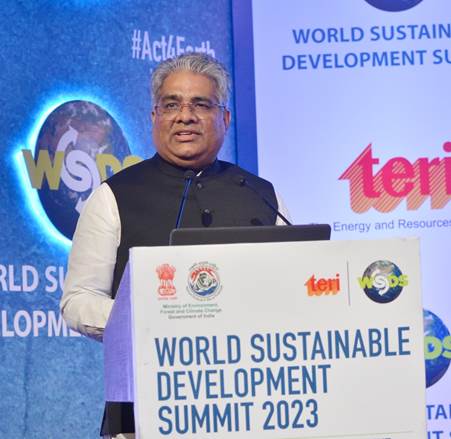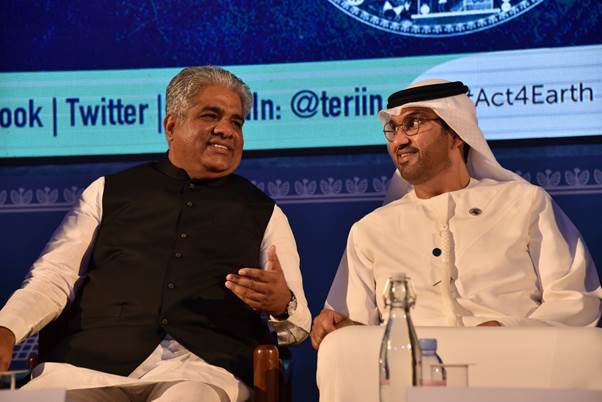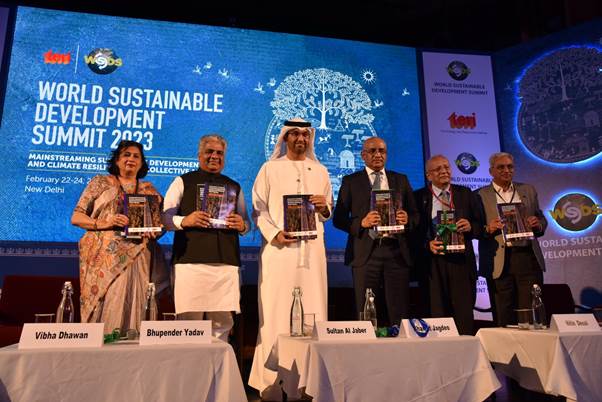Ministry of Environment, Forest and Climate Change
Shri Bhupender Yadav says that under India’s G20 Presidency, the concept of ‘Green Growth’ being a priority area validates how sustainable development has been mainstreamed in Indian policy making process through a visionary approach
Living in harmony with nature has been traditionally ingrained in Indian ethos and same has been reflected by the mantra of LiFE given by Prime Minister Shri Narendra Modi: Shri Yadav
प्रविष्टि तिथि:
22 FEB 2023 5:50PM by PIB Delhi
Union Minister for Environment, Forest and Climate Change, Shri Bhupender Yadav, today delivered the keynote address on Visionary Leadership for Mainstreaming Sustainable Development and Climate Resilience at the inaugural session of the World Sustainable Development Summit 2023 held in New Delhi.

His Excellency, Dr Bharrat Jagdeo, Vice President, Republic of Guyana, His Excellency, Dr Sultan Al Jaber, Special Envoy on Climate Change and COP28 President Designate, UAE, Mr Nitin Desai, Chairman, TERI, and Ms Vibha Dhawan, Director General TERI were also present.

Speaking on this occasion, Shri Bhupender Yadav said that continuing last year’s theme and discussion, the Summit, this year is premised on “Mainstreaming Sustainable Development and Climate Resilience for Collective Action” which came at no better time when India has assumed the G20 presidency. He said that at a time, when the world is tackling the issues pertaining to climate action, environmental protection, and sustainable development, it is under the visionary leadership of Prime Minister Shri Narendra Modi, that India is emerging as an inspiration for countries across the globe, particularly on the fact that how economic development and conservation of environment can go hand in hand.
Shri Yadav said that the vision of Prime Minister Shri Narendra Modi of correcting the ecological wrong into ecological harmony is taking shape by being reflected at the grassroots, where the successful implementation of Project Cheetah is an example among many. He said that second batch of cheetahs from South Africa was successfully introduced in Kuno National Park in Madhya Pradesh on 18th February 2023.
In his address, Shri Yadav said that combating Climate Change, Biodiversity loss and land degradation transcends all political boundaries and hence is a shared global challenge. On multiple occasions both at the domestic and international stage, through evidence-based policy making and implementation, India, has demonstrated that it has never been a part of the problem but is contributing significantly to become a part of the solution.
Highlighting the provisions of Union Budget 2023 – 2024 presented in Parliament earlier this month, Shri Yadav said that it lays down the vision for ‘Green Growth’ across multiple sectors, with the underlying thought being that all future growth in the country has to essentially be green. "With the concept of ‘Green Growth’ being a priority area in the Union Budget, it validates how sustainable development has been mainstreamed in Indian policy making process through a visionary approach", said Shri Yadav.
Speaking of India's commitment to address climate change, Shri Yadav said that India has already submitted its Long-Term Low Emission Development Strategy document at COP 27 in Sharm El Sheikh which is premised on two major pillars of climate justice and sustainable lifestyles alongside principles of CBDR-RC. With this India has joined list of select 58 countries who have submitted their new or updated LT-LEDS.
The Union Environment Minister said that not only at the domestic level but at international platform, particularly focusing on Climate Resilience, India has been helpful by providing value additional inputs, especially to Small Island Developing Nations who are particularly vulnerable to rising sea levels. India has created and been nurturing the CDRI or Coalition for Disaster Resilient Infrastructure. India has been making concerted efforts to engage various stakeholder institutions and individuals to promote innovation and resilience in infrastructure.
One such initiative is the “DRI Connect” which will be a web-based platform for stakeholders engaged in infrastructure sectors. The platform is envisaged to harness the collective intelligence of Coalition membership towards the creation of new knowledge and actionable solutions to address challenges in resilient infrastructure and foster an environment of action-based learning and innovation on disaster resilient infrastructure.
Shri Yadav emphasised that building upon the announcements made at COP 26 in presence of Prime Minister, IRIS or Infrastructure for Resilient Island States as a part of CDRI has been critical in achieving sustainable development through a systematic approach to resilient, sustainable, and inclusive infrastructure for Small Island Developing Countries. Shri Yadav said that the voice of Global South Summit launched by Prime Minister Shri Narendra Modi, which saw participation of 134 countries distributed across 10 sessions gave the global south a platform to discuss the pressing concerns of developing world. This was yet another testimony of India’s leadership, especially becoming the leading voice for global south.
Addressing the gathering on the sub theme of the session which focuses on the mainstreaming sustainable development in India’s national development trajectory, Shri Yadav said that with India taking over the G20 presidency, the discourse around sustainable development especially in the UN Critical Decade of Action has caught the global attention.
Shri Yadav said that living in harmony with nature has been traditionally ingrained in Indian ethos and same has been reflected by the mantra of LiFE or Lifestyle for Environment coined by Prime Minister Shri Narendra Modi. The mantra which focuses on nudging individual behaviour towards leading a sustainable lifestyle has received attention and appreciation from world leaders and leading experts across the globe and has been included in the cover decision text of Sharm El Sheikh implementation plan at COP 27. The ‘One-Word mass Movement’ – “Lifestyle for Environment”, to the global community which has been reflected in India's updated NDCs, is now significant in propagating a healthy and sustainable way of living based on traditions and values of conservation and moderation which essentially has SDG 12 at its core on sustainable production and consumption.
Speaking on the key aspect in enabling sustainable development, Shri Yadav said that circular economy offers a new paradigm that emphasizes on the need to take a comprehensive view of products and processes. This leads to sustainable growth which is a key to an Aatmanirbhar Bharat. Shri Yadav highlighted that the Government has been actively formulating policies and promoting projects to drive the country towards a circular economy. India has already notified various rules, such as the Plastic Waste Management Rules, e-Waste Management Rules, Construction and Demolition Waste Management Rules, Metals Recycling Policy, etc, in this regard.
Speaking of the first Environment and Climate Sustainability Working Group meeting of G20 which was held in Bengaluru on 9-11 February 2023, Shri Yadav said that the working group meeting saw extensive deliberations on topics which had sustainable development and Climate resilience at its heart. The topic discussed during three-day discussion were:
- Arresting Land Degradation, Accelerating Ecosystem restoration and Enriching Biodiversity
- Promoting Sustainable and Climate Resilient blue economy
- Encouraging resource efficiency and Circular Economy
Apart from the given topics, Shri Yadav said that the delegates from G20 countries also deliberated on Accelerating Climate Action, Science and Gaps and role of Mission LiFE in further conservation of environment.
Shri Yadav emphasised that despite being the fastest-growing economy in the World, India is taking giant strides at the domestic and international levels in tackling the triple planetary crisis in form of climate change, biodiversity loss and pollution. India under the able leadership of Prime Minister Shri Narendra Modi has got seventy five Ramsar Wetland sites, 33rd Elephant Reserve, 53rd tiger reserve, twelve Blue Flag Beaches, successfully implemented Single Use Plastic Ban, updated its NDCs, successfully reintroduced Cheetahs from two countries and demonstrated strong and bold leadership at COP 27 in Sharm El Sheikh and CBD COP 15 in Montreal. These examples testify the fact that India’s development trajectory and policy making process has mainstreamed sustainable development and climate resilience at its core.
The Union Environment Minister said that World Sustainable Development Summit for the past two decades has been successful in engaging all the stakeholders from public and private sphere of life and has hence been forerunner in deliberating on subject of sustainable development. Shri Yadav concluded his address by quoting Prime Minister Shri Narendra Modi who very effectively summarised the idea of Sustainable Development:
“Equitable energy access to the poor has been a cornerstone of our environmental policy, Indians have always lived in harmony with nature. Our culture, rituals, daily practices and numerous harvest festivals demonstrate our strong bonds with nature. Reduce, reuse, recycle, recover, re-design and re-manufacture have been part of India's cultural ethos. India will continue to act for climate resilient policies and practices as we have always done” – Shri Narendra Modi
On this occasion Shri Yadav also released the report on “Assessment of Avoided CO2 Emissions during Construction and Operation of National Highways”. The report assesses the extent of CO2 which can be avoided per km in construction of the National Highways.

***
MJPS/SSV
(रिलीज़ आईडी: 1901475)
आगंतुक पटल : 4051